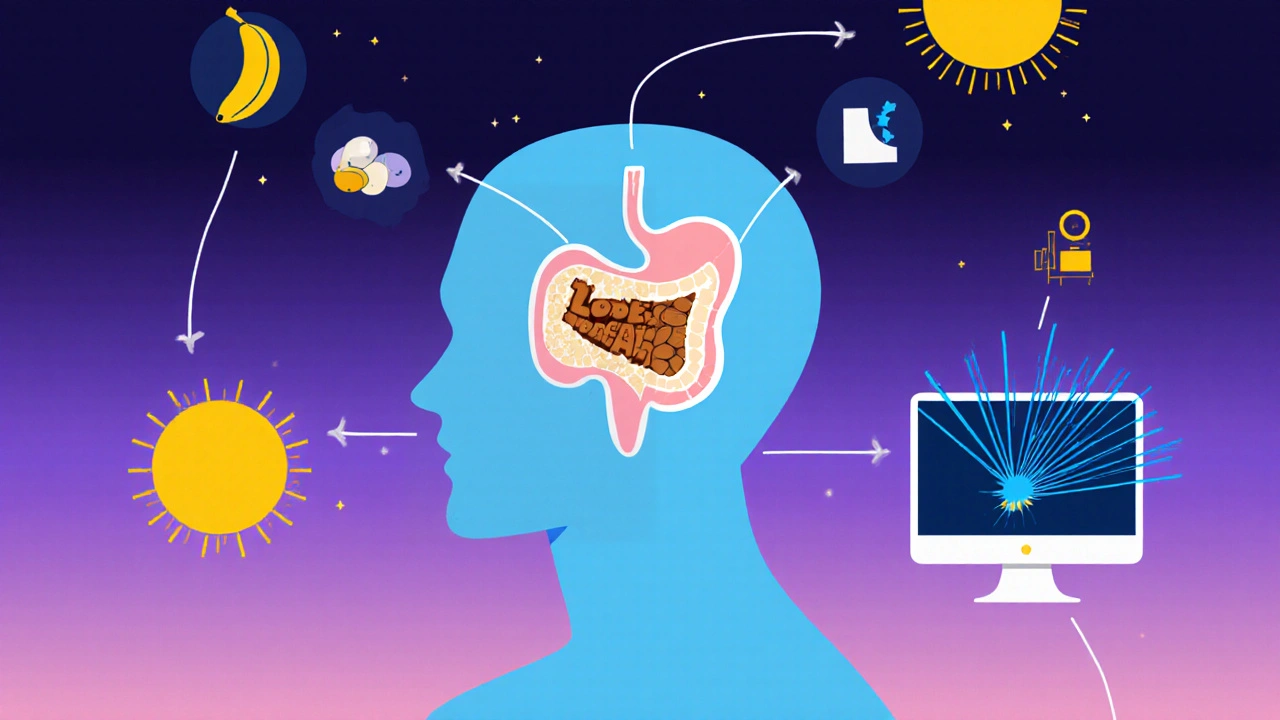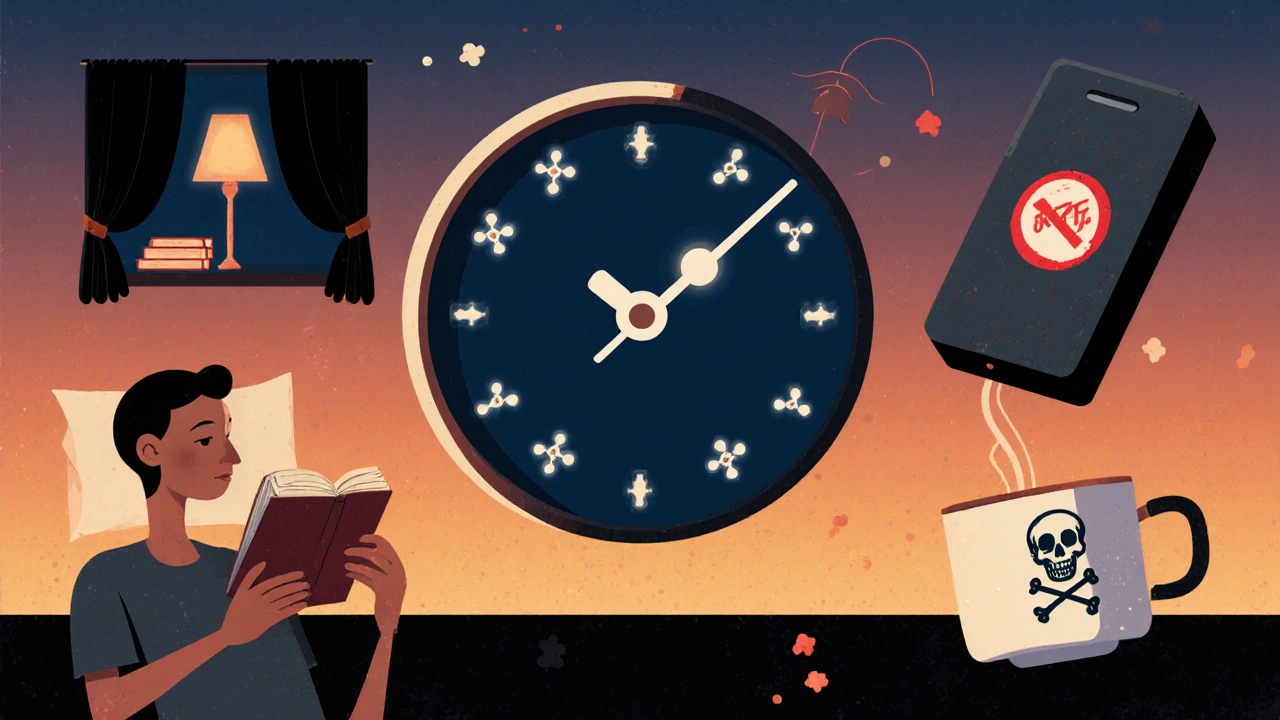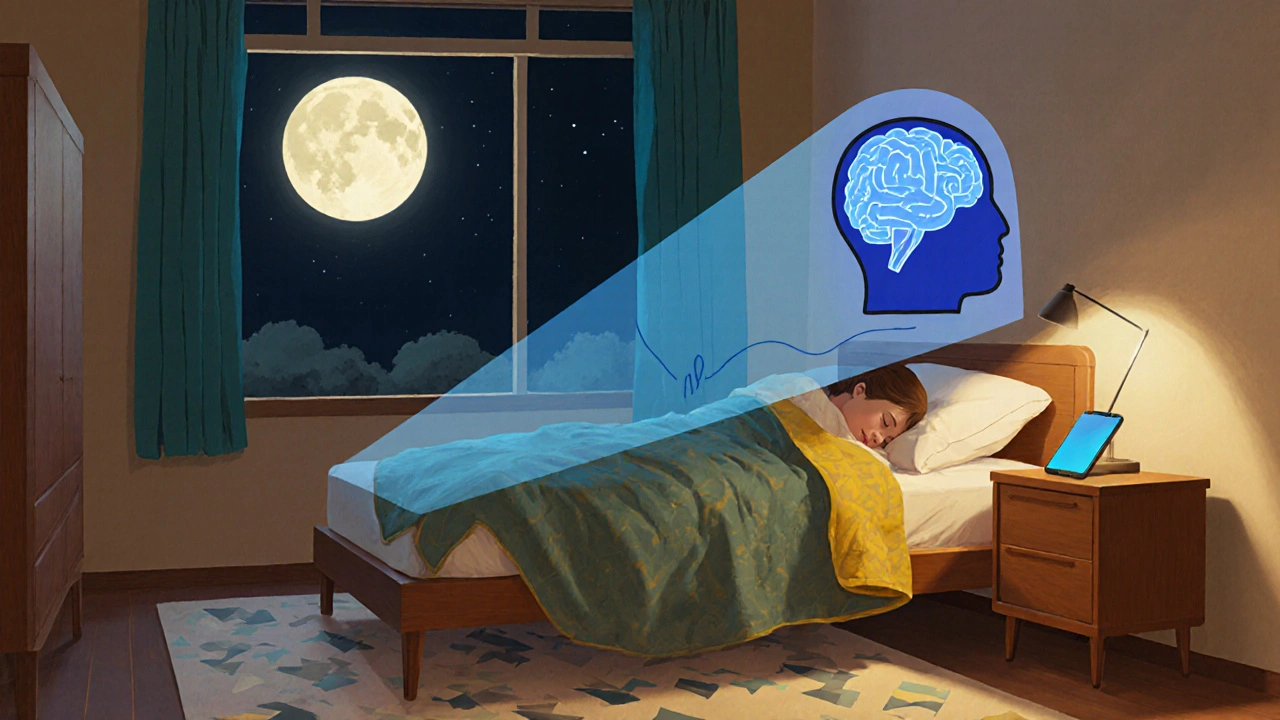Most people think of melatonin as just another sleep pill you can buy at the pharmacy. But it’s not a drug-it’s your body’s natural signal that it’s time to rest. If you’ve ever struggled to fall asleep after scrolling through your phone at night, or felt wide awake at 2 a.m. even though you’re exhausted, you’re dealing with your melatonin levels being out of sync. This isn’t about willpower. It’s biology.
What melatonin actually does
Melatonin is a hormone made by your pineal gland, a tiny structure deep in your brain. It doesn’t make you sleepy like a sedative. Instead, it tells your body: it’s nighttime. Your body naturally produces more melatonin when it gets dark, and less when light hits your eyes. That’s why turning off the lights helps you feel tired. Your brain uses light as a clock. When the sun goes down, melatonin rises. When the sun comes up, melatonin drops. Simple. Clean. Biological.
But modern life messes with this rhythm. Blue light from phones, tablets, and LED screens tricks your brain into thinking it’s still daytime. Even dim night lights can delay melatonin release by up to 90 minutes. That’s why you might feel alert at 11 p.m. even though your body is begging for sleep.
How your body makes melatonin
Your body builds melatonin from serotonin, a chemical linked to mood and digestion. The process starts with tryptophan-an amino acid found in turkey, eggs, nuts, and dairy. Your body converts tryptophan into serotonin, then into melatonin. That’s why eating a banana or a handful of almonds before bed might help a little. But food alone won’t fix a broken sleep cycle. Your pineal gland needs darkness to do its job.
Age also changes how much melatonin you make. By age 50, most people produce about half the melatonin they did in their 20s. By 70, it’s often less than a quarter. That’s why older adults often wake up early or have trouble falling asleep. It’s not just stress or bad habits. It’s a natural drop in hormone production.
Melatonin supplements: what they can and can’t do
Melatonin supplements are widely available over the counter. But they’re not magic. They don’t force sleep. They just nudge your internal clock. Think of them like a remote control for your body’s sleep schedule-not a power button.
They work best for:
- Jet lag: Taking 0.5-5 mg one hour before bedtime at your destination helps reset your clock faster.
- Shift work: If you work nights and need to sleep during the day, melatonin can help signal your body it’s time to rest-even with sunlight streaming in.
- Delayed sleep phase disorder: People who naturally fall asleep after 2 a.m. and wake up late can use low doses to shift their rhythm earlier.
They don’t work well for:
- General insomnia caused by anxiety, pain, or poor sleep habits
- Long-term sleep problems without a circadian rhythm issue
- People who just need more sleep hours-melatonin won’t give you extra rest if you’re not giving your body time to recover
Dosage: less is more
Most people take way too much melatonin. The average supplement pill has 3-10 mg. But your body naturally releases less than 0.3 mg per night. Studies show that 0.3-0.5 mg is often enough to reset your clock. Higher doses don’t make you sleep deeper-they just flood your system, which can cause grogginess, headaches, or even strange dreams.
Start with 0.5 mg, taken 60-90 minutes before bed. If that doesn’t help after a week, try 1 mg. Don’t go above 3 mg unless advised by a doctor. Many people feel better on lower doses because they’re closer to what their body expects.

When to take it-and when not to
Timing matters more than dosage. Taking melatonin at the wrong time can make jet lag worse. If you’re flying east, take it in the evening at your destination. If you’re flying west, take it in the morning. The goal is to shift your rhythm, not just force sleep.
Don’t take melatonin if:
- You’re pregnant or breastfeeding
- You have an autoimmune disease
- You’re on blood thinners, diabetes meds, or immunosuppressants
- You have depression or bipolar disorder-melatonin can affect mood regulation
Also, avoid taking it with alcohol. It doesn’t mix well. You might feel drowsier, but your sleep quality drops. Your brain doesn’t go through the full sleep cycles it needs.
What affects melatonin naturally
You don’t need pills to fix your sleep. Small changes can boost your natural melatonin:
- Get sunlight within 30 minutes of waking up-this sets your clock for the whole day
- Use dim, warm lighting after sunset. Avoid bright white LEDs
- Keep your bedroom cool (around 18°C) and completely dark
- Stop screens at least 60 minutes before bed. If you must use one, turn on night mode and lower brightness
- Try a consistent bedtime-even on weekends. Your body thrives on routine
One study from the University of Manchester found that people who turned off screens 90 minutes before bed and used blackout curtains improved their sleep onset time by an average of 27 minutes in just two weeks. No supplements needed.
Can you become dependent on melatonin?
No. Unlike sleeping pills, melatonin doesn’t cause physical dependence or withdrawal. You won’t need more over time to get the same effect. But if you rely on it every night for months, your body might stop producing as much on its own-just like any habit. That’s why it’s best used short-term: a few days for jet lag, a couple of weeks to reset a schedule.
Think of it like a reset button. Once your rhythm is back on track, you can stop. Let your body take over again.

What to look for in a supplement
Not all melatonin supplements are created equal. A 2023 analysis by the UK’s Medicines and Healthcare products Regulatory Agency found that nearly 70% of over-the-counter melatonin products contained more than the labeled amount. Some had up to 470% more. Others had traces of serotonin or even prescription sedatives.
Choose products with:
- Third-party testing (look for USP, NSF, or ConsumerLab seals)
- Low doses: 0.5-1 mg is ideal for most
- No added fillers like artificial colors, gluten, or soy
- Time-release formulas only if you wake up in the middle of the night-otherwise, fast-release is better
Stick to brands sold in regulated markets like the UK, EU, or Canada. Avoid random online sellers with no reviews or lab reports.
Other sleep hormones and how they connect
Melatonin doesn’t work alone. It’s part of a team:
- Cortisol: The stress hormone. It should drop at night. High cortisol = trouble falling asleep.
- GABA: A calming brain chemical. It helps quiet your mind. Magnesium and chamomile support GABA.
- Adenosine: Builds up the longer you’re awake. It’s why you feel tired after 16 hours. Caffeine blocks it.
If you’re still struggling with sleep after using melatonin, it might not be a melatonin problem. It could be stress, caffeine, or poor sleep hygiene. Melatonin fixes timing-not quality.
When to see a doctor
See a healthcare provider if:
- You’ve tried melatonin for 2 weeks with no improvement
- You wake up gasping, snore loudly, or feel tired even after 8 hours
- You have mood changes, memory issues, or daytime drowsiness
- You’re taking other medications
These could be signs of sleep apnea, restless legs, depression, or thyroid issues-all of which need different treatments.
Can melatonin help with insomnia?
Melatonin helps with sleep timing, not the deep, restful sleep most people associate with insomnia. If your problem is racing thoughts, anxiety, or physical pain keeping you awake, melatonin won’t fix it. Cognitive behavioral therapy for insomnia (CBT-I) is the gold standard treatment for chronic insomnia. Melatonin might help if your body clock is off, but not if your brain won’t quiet down.
Is melatonin safe for kids?
Some children with autism, ADHD, or developmental delays may benefit from low-dose melatonin under medical supervision. But for healthy children, it’s not recommended. Their bodies make enough. Poor sleep in kids is usually caused by screen time, inconsistent routines, or anxiety-not low melatonin. Talk to a pediatrician before giving it to a child.
Does melatonin cause weight gain?
No direct link exists between melatonin and weight gain. But poor sleep does. If melatonin helps you sleep better, you might eat less sugar and crave fewer carbs the next day. That could lead to weight loss. On the flip side, if you take too much and feel groggy, you might move less-which could contribute to weight gain. It’s indirect, not caused by the hormone itself.
Can you take melatonin every night?
You can, but you shouldn’t unless you have a diagnosed circadian rhythm disorder. Long-term nightly use isn’t harmful in the way sleeping pills are, but it’s unnecessary for most people. Your body can regain its natural rhythm with better sleep habits. Use melatonin as a short-term tool, not a daily crutch.
What’s the best time to take melatonin?
60 to 90 minutes before your target bedtime. That gives your body time to absorb it and start signaling sleep. Taking it too early (like at 7 p.m. if you want to sleep at 11 p.m.) can shift your rhythm too soon. Taking it too late (right before bed) might not have enough time to work. Timing is everything.
Final thoughts: it’s not the supplement-it’s the rhythm
Melatonin is a powerful clue to how your body tells time. But it’s not the solution to every sleep problem. Real sleep health comes from respecting your body’s natural rhythms: darkness at night, light in the morning, consistency, and calm. Supplements can help you get back on track-but they won’t replace good habits. If you want to sleep better, don’t just reach for a pill. Turn off the lights, silence your phone, and let your body do what it was built to do.


Jeff Moeller
November 18, 2025 AT 14:24Light is the real boss of your sleep. Not pills. Not willpower. Just darkness. Turn off the screens. Let your pineal gland do its job. Simple. Biological. No magic needed.
Tyrone Luton
November 19, 2025 AT 12:11You know what's funny? People think they need supplements to fix what they broke with their phones. You don't need melatonin-you need discipline. You need to stop treating your bedroom like a Netflix lounge. Your body didn't evolve to glow in the dark. It evolved for firelight and stars. Stop fighting nature with chemistry.
Herbert Scheffknecht
November 20, 2025 AT 23:10It's not just about melatonin-it's about rhythm. The body isn't a machine you can reboot with a button. It's a symphony. Cortisol, GABA, adenosine-they're all playing in harmony until you crash the orchestra with blue light and caffeine. Melatonin? It's just the conductor raising the baton. But if the musicians are all drunk on sugar and screens, even the best conductor can't save the performance. You gotta clean the stage first.
Lauren Hale
November 22, 2025 AT 00:22I used to take 5mg every night. Felt like a zombie the next day. Then I tried 0.3mg, turned off the lights at 9:30, and started waking up naturally at 6:30. No alarm. No guilt. Just quiet. It’s not about the pill-it’s about creating space for your body to remember how to rest. You don’t need more. You need less. Less light. Less noise. Less pressure.
Greg Knight
November 22, 2025 AT 15:09Let me tell you something-this isn’t just about sleep. It’s about reclaiming your life. When you fix your circadian rhythm, everything else improves. Mood. Focus. Energy. Even your relationships. I used to snap at my kids because I was exhausted. Now I’m present. Not because I’m stronger. Because I stopped lying to my body. Darkness isn’t optional. It’s medicine. And the dose? Less than you think. Start with 0.5mg and turn off the TV. Watch what happens.
rachna jafri
November 22, 2025 AT 23:50Big Pharma doesn't want you to know this-but melatonin is just a gateway. They sell you the pill so you never question why your brain won't shut off. Why? Because they profit from your insomnia. Look at the labels-70% are over-dosed. Some even have serotonin. That's not a supplement. That's a chemical trap. Your body knows how to sleep. They just made you forget. Reclaim your biology. Turn off the lights. Burn the blue screens. Fight the system.
darnell hunter
November 24, 2025 AT 19:54The assertion that melatonin does not induce physical dependence is scientifically inaccurate. While it lacks the pharmacological profile of benzodiazepines, chronic exogenous administration may downregulate MT1/MT2 receptor expression in the suprachiasmatic nucleus, thereby inducing physiological adaptation. Furthermore, the claim that 0.3–0.5 mg is sufficient is supported only by limited double-blind trials with small sample sizes. Regulatory oversight of OTC supplements remains inadequate, and consumer exposure to unverified formulations constitutes a public health concern. Recommend consultation with a sleep specialist prior to prolonged use.
Hannah Machiorlete
November 24, 2025 AT 23:39I tried melatonin for a week. Woke up at 3am feeling like my brain was on fire. Had nightmares about my ex holding a phone that glowed red. Now I just stare at the ceiling and cry. At least the dark is quiet. But I miss the glow.